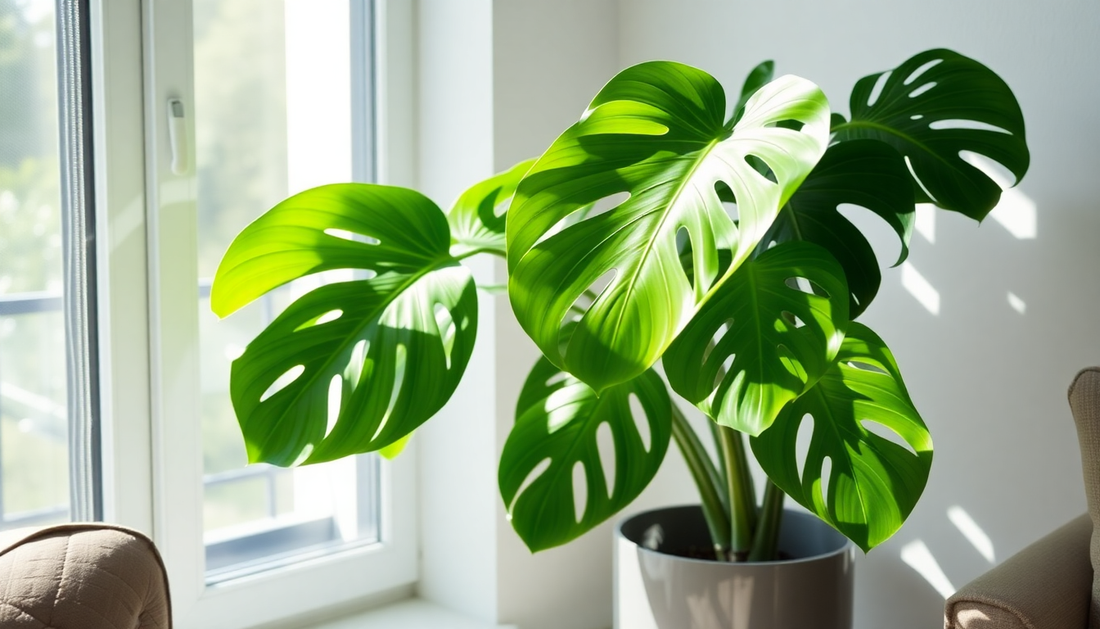
Thriving Monstera in Small Spaces: A Guide to Caring for this Lush Houseplant
Share
As urban living becomes increasingly popular, finding the right plants to thrive in small apartments can be a challenge. However, the Monstera deliciosa, also known as the Swiss Cheese Plant, is a versatile and stunning houseplant that can flourish even in limited square footage. With its large, glossy leaves and unique fenestrations, the Monstera is a statement piece that can instantly elevate the ambiance of any indoor space.
In this comprehensive guide, we'll explore the essential tips and techniques for caring for a Monstera in a small apartment, ensuring that your lush, tropical oasis can thrive, no matter the size of your living quarters.
Understanding the Monstera Deliciosa
The Monstera deliciosa is a member of the Araceae family, native to the tropical rainforests of southern Mexico and Central America. In its natural habitat, this plant can grow to impressive heights, with leaves that can reach up to three feet in length. However, when grown indoors, the Monstera can be easily managed and trained to fit even the most compact of living spaces.
One of the Monstera's most distinctive features is its unique leaf pattern, which features natural perforations and splits. These fenestrations not only add to the plant's visual appeal but also serve a functional purpose, allowing the leaves to better adapt to their environment and capture more light.
Choosing the Right Pot and Soil
When it comes to growing a Monstera in a small apartment, the choice of pot and soil is crucial. Opt for a well-draining, slightly acidic potting mix that is specifically formulated for tropical plants. Avoid heavy, dense soils, as they can lead to waterlogging and root rot.
The size of the pot is also essential. While Monstera plants can tolerate being slightly root-bound, it's important to choose a container that allows for some room for growth. A pot that is just a few inches wider than the plant's root ball is a good starting point. Remember to select a pot with adequate drainage holes to prevent excess moisture buildup.
Lighting and Placement
Monstera plants thrive in bright, indirect light. Positioning your Monstera near a sunny window, but out of direct sunlight, is ideal. Avoid placing the plant in dark corners or areas with low light, as this can lead to stunted growth and a loss of the plant's signature fenestrations.
If your apartment doesn't have a suitable spot with natural light, consider investing in a grow light. These specialized lamps can provide the necessary illumination to keep your Monstera happy and healthy.
Watering and Humidity
Proper watering is crucial for the Monstera's well-being. These plants prefer a consistent, moderate watering schedule, with the soil allowed to partially dry out between waterings. Avoid letting the soil become completely dry, as this can lead to stress and wilting.
In small apartments, maintaining the right humidity levels can be a challenge. Monstera plants thrive in humid environments, with ideal humidity levels ranging from 50% to 80%. To combat low humidity, consider using a pebble tray, a humidifier, or regularly misting the leaves with a spray bottle.
Pruning and Training
As the Monstera grows, it's important to prune and train the plant to maintain its shape and size. Regular trimming of any damaged or dead leaves can help the plant focus its energy on new growth. Additionally, you can use stakes, trellises, or moss poles to guide the Monstera's climbing vines and support its large leaves.
Pruning should be done with clean, sharp scissors or pruners, and it's best to do it during the growing season, typically in the spring and summer.
Fertilizing and Repotting
To ensure your Monstera thrives in a small apartment, it's essential to provide it with the necessary nutrients. Use a balanced, water-soluble fertilizer every two to three weeks during the growing season. Avoid over-fertilizing, as this can lead to excessive growth and potential issues.
As the Monstera matures, it will eventually outgrow its pot. When this happens, it's time to repot the plant into a slightly larger container. This process should be done in the spring or early summer, when the plant is actively growing. Be gentle when handling the roots, and make sure the new pot has adequate drainage.
Troubleshooting Common Issues
Even with the best care, Monstera plants can sometimes encounter challenges. Here are a few common issues and how to address them:
- Yellowing leaves: This can be a sign of overwatering, underwatering, or nutrient deficiency. Adjust your watering schedule and consider fertilizing the plant.
- Brown, crispy leaves: Dry air or too much direct sunlight can cause the leaves to become brown and crispy. Increase humidity and move the plant to a spot with more indirect light.
- Drooping leaves: Drooping leaves can indicate that the plant is not getting enough water. Check the soil moisture and adjust your watering routine accordingly.
- Pests: Monstera plants can be susceptible to common houseplant pests, such as spider mites or mealybugs. Inspect the plant regularly and treat any infestations promptly.
By understanding the specific needs of the Monstera and addressing any issues that arise, you can create a thriving, lush oasis in your small apartment, bringing the beauty of the tropics right into your living space.
Conclusion
The Monstera deliciosa is a versatile and stunning houseplant that can thrive even in the most compact of living spaces. By following the tips and techniques outlined in this guide, you can create a lush, tropical haven in your small apartment, enjoying the Monstera's unique foliage and the many benefits it brings to your indoor environment.
Remember, with the right care and attention, your Monstera can grow to be a true showstopper, adding a touch of the exotic to your urban oasis. Happy gardening!
